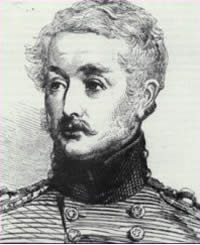George Rice-Trevor, 4th Baron Dynevor
George Rice-Trevor, 4th Baron Dynevor (born August 5, 1795 , † October 7, 1869 in Great Malvern ) was a British nobleman and politician.
Origin and youth
Rice-Trevor came from the old Welsh Rhys family , who Anglicized their name to Rice. He was born as George de Cardonell, the eldest son of George Talbot Rice , who at the time of his birth had taken the name De Cardonnel, and of Frances Townshend, daughter of Thomas Townshend, 1st Viscount Sydney . He attended Westminster School from 1806 to 1812 and studied at Christ Church College , Oxford from 1812 . In 1817 his father took the family name Rice again.
Member of Parliament for Carmarthenshire
His father was the undisputed leader of the Tories in Carmarthenshire. After his son came of age, he got his son to be Tories candidate for Carmarthenshire in the 1820 general election. George Rice won the election but did not stand out in the House of Commons. He supported the government and was an opponent of Catholic emancipation . When in 1823 citizens of Carmarthenshire petitioned the government because of the great poverty in the county, he prevented them from calling for electoral reform. As a strictly conservative politician, he was even against his wife accompanying him on political trips. In September 1823 he inherited from John Trevor, 3rd Viscount Hampden , with whom he was related through his paternal grandmother, the indebted estate Bromham in Bedfordshire , which is why he changed his name to Rice-Trevor on October 28, 1824. In the general election of 1826 and 1830, Rice-Trevor was re-elected as Knight of the Shire . He was still strictly anti-Catholic and voted against the abolition of the Test Act , for which he received the support of the Methodists from Carmarthenshire. Even when Prime Minister Wellington advocated Catholic emancipation in 1829, he continued to vote against the law. Rice-Trevor also voted against changing the Corn Laws . He also campaigned for the gradual abolition of slavery, for which he was criticized by dissenters from his constituency, for whom this attitude did not go far enough. In 1828, against the resistance of William Powlett, he passed a law to expand the port of Burry Port . In 1829 he advocated only moderate reform of the Welsh judiciary. In 1830 he supported James Crichton-Stuart to promote mining in Carmarthenshire by easing the coal tariff. In the general election in 1831 he renounced because of its increasing unpopularity in favor of James Hamlyn Williams on a new candidacy, but in the general election after the electoral reform in 1832 he ran again and was re-elected. He was also re-elected in the following elections before he inherited the title of Baron Dynevor after the death of his father on April 9, 1852 . With the title he became a member of the House of Lords and therefore resigned his mandate as MP. From 1852 until his death, he served Queen Victoria as an aide-de-camp . He died of paralysis .
Role during the Rebecca Riots
From November 1842 there were unrest among the impoverished rural population in South West Wales, the so-called Rebecca Riots . Rice-Trevor was not only a member of parliament, but also a lieutenant colonel in the Carmarthenshire militia and, as a vice lieutenant, deputy to his father, the lord lieutenant of Carmarthenshire, who was then 77 years old . After an attack by insurgents in the workhouse in Carmarthen on 19 June 1843 Rice Trevor came back from London to Wales, to restore order. When insurgents also burned granaries on his Llandeilo estates, the unrest also became his personal concern. As early as June 1843 he was considering using the army to suppress the unrest. Unknown people laid an empty grave for him in front of his country estate Newton House in September 1843 , whereupon Rice-Trevor surrounded himself with a military escort. The military, finally called for help, proved to be ineffective against the guerrilla tactics of the rebels; numerous rebels could only be arrested and the unrest put down through denunciations .
Family and offspring
On October 27, 1824, he married Frances Fitzroy, daughter of General Charles FitzRoy. He and his wife had five daughters:
- Frances Emily Rice-Trevor († 1863) ∞ Edward ffolliott Wingfield
- Caroline Elizabeth Anne Rice-Trevor (1827–1887) ∞ Thomas Bateson, 1st Baron Deramore
- Eva Gwenllian Rice-Trevor († 1842)
- Selina Rice-Trevor (1836–1913) ∞ William Lygon Pakenham, 4th Earl of Longford
- Eleanore Mary Rice-Trevor († 1897)
Since he died without male descendants, inherited after his death his cousin, Reverend Francis William Rice (1804-78), the rector of Fairford in Gloucestershire , the title of Baron Dynevor and the family estates of Dynevor and Kidwelly . He bequeathed his other Welsh estates, his London townhouse and Barrington Park in Gloucestershire to his grandson Edward Rhys Wingfield , the eldest son of his eldest daughter Frances.
Web links
- Margaret Escott: RICE, Hon. George Rice (1795-1869), of Barrington Park, Glos. and Dynevor Castle, Carm. (History of Parliament online)
- Llandeilo through the Ages: Policing Rebecca. The 4th Lord and the Rebecca Riots
| predecessor | Office | successor |
|---|---|---|
| George Talbot Rice |
Baron Dynevor 1852–1869 |
Francis William Rice |
| personal data | |
|---|---|
| SURNAME | Rice-Trevor, George, 4th Baron Dynevor |
| ALTERNATIVE NAMES | De Cardonell, George; Rice, George; Rice-Trevor, George |
| BRIEF DESCRIPTION | British nobleman and politician, member of the House of Commons |
| DATE OF BIRTH | August 5, 1795 |
| DATE OF DEATH | October 7, 1869 |
| Place of death | Great Malvern |
